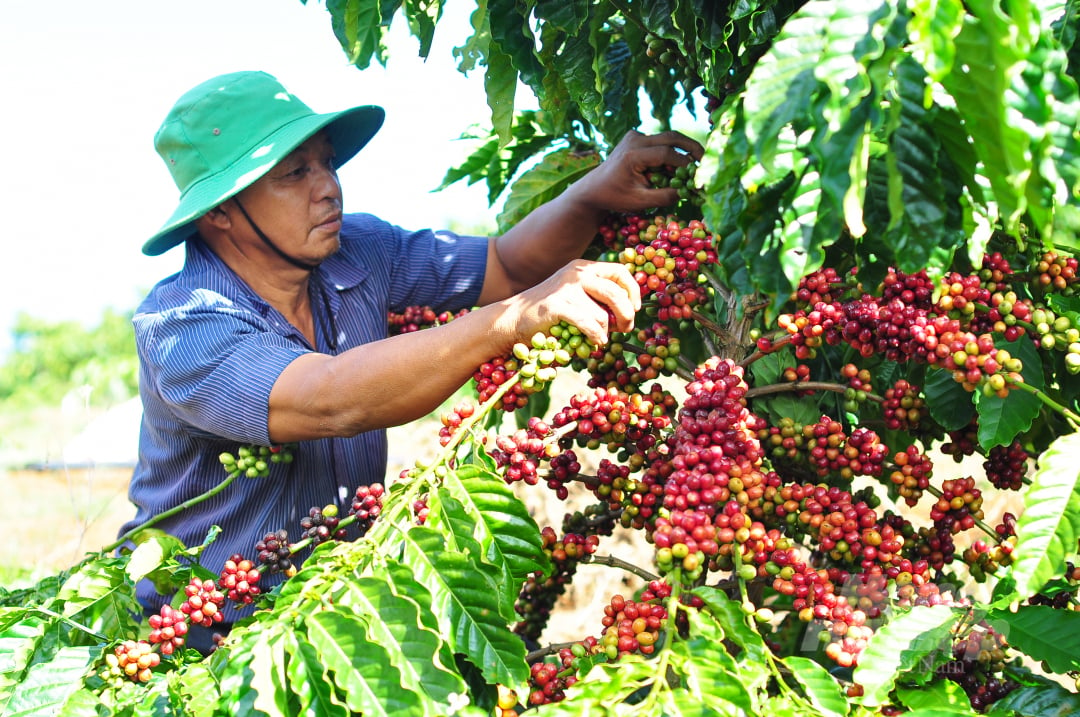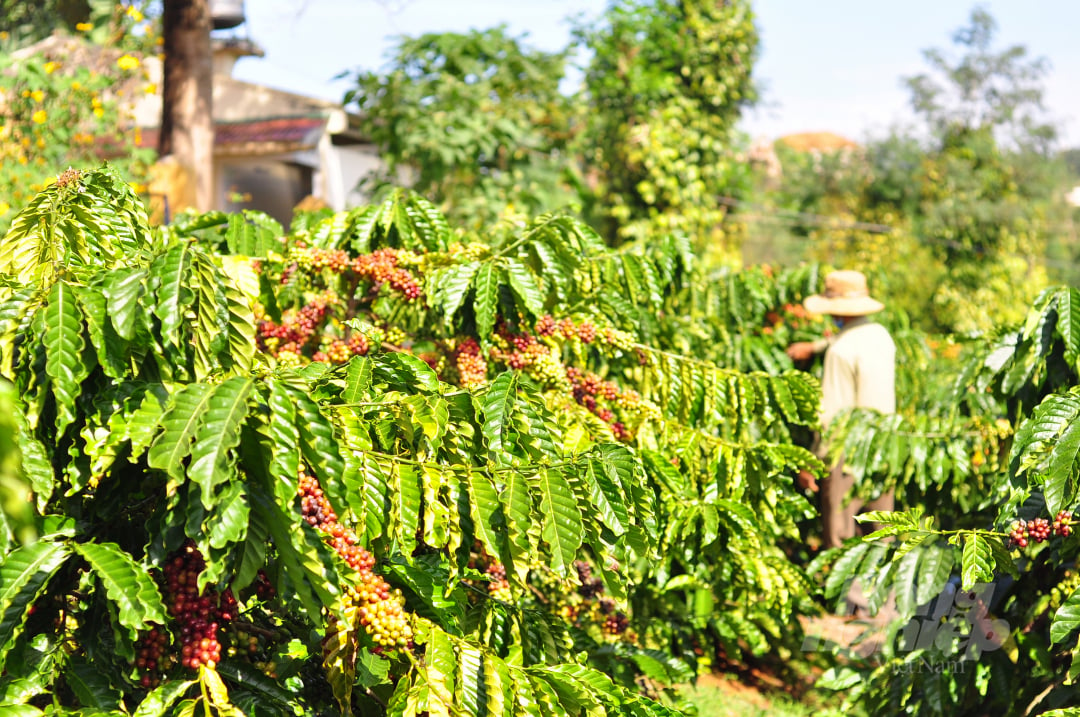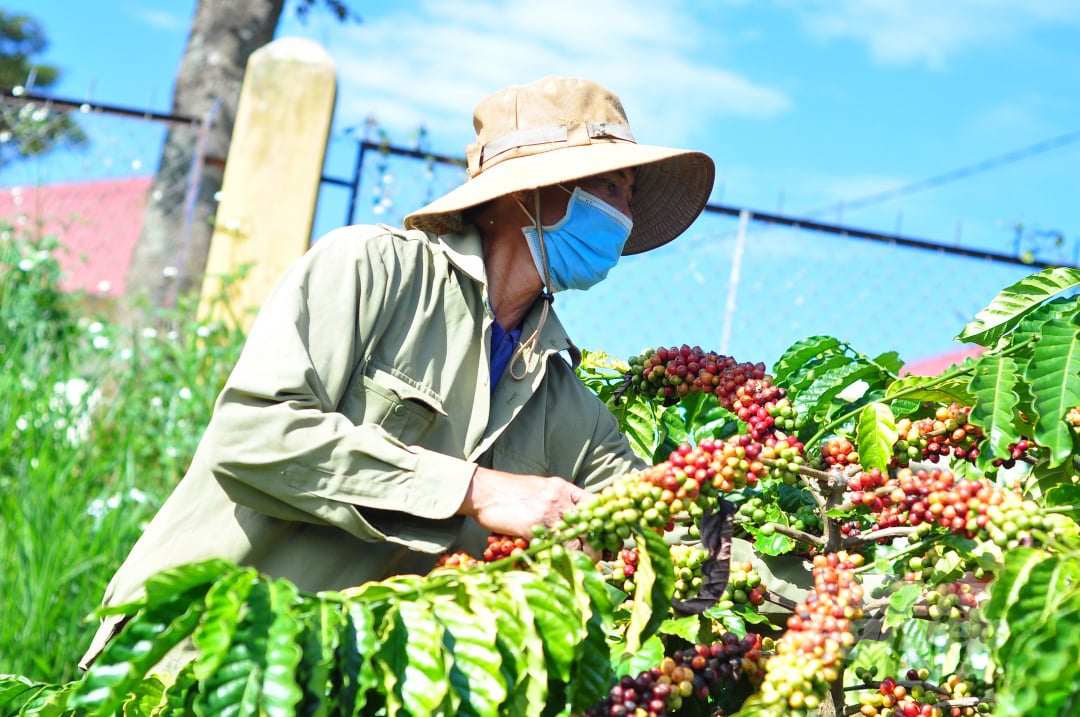November 27, 2025 | 10:30 GMT +7
November 27, 2025 | 10:30 GMT +7
Hotline: 0913.378.918
November 27, 2025 | 10:30 GMT +7
Hotline: 0913.378.918

Coffee growers participating in the VnSAT project in Lam Dong province expect large enterprises to sign and consume products. Photo: M.H.
In Lam Dong province, the VnSAT project has many activities to support farmers, cooperatives, and cooperative groups for coffee production. The project's programs have contributed to changing people's perception of production methods to improve product value.
Mr. Tran Van Xuat, Director of Nam Ban Agricultural Cooperative (Nam Ban town, Lam Ha district, Lam Dong province) said that the models supported by the VnSAT project have all developed superior to traditional methods. system. In particular, people know how to apply science and technology to farming to reduce input costs and increase profits. Over the past time, the VnSAT project has supported the cooperative in carrying out the process of selectively harvesting, drying, and preliminarily processing coffee to improve the quality of the product.
According to Mr. Xuat, at present, the cooperative cooperates with member households and signs contracts to purchase fresh coffee at a price higher than the market price. The member households therefore also have to focus on producing according to the standard process, picking 100% ripe coffee. The association of production and consumption of products has been well organized by the cooperative. However, Nam Ban Agricultural Cooperative is still concerned about finding a large outsourcing enterprise.
With the support of the VnSAT project, each year, our cooperative produces about 100 tons of premium green coffee and 150 tons of regular coffee. Currently, our premium coffee products are a big business. We still have to find output," said Mr. Tran Van Xuat, adding that currently, the cooperative has not been able to reach out to the large market and is trying to find partners to bring high-quality products to the exporting markets.

Coffee models supported by the VnSAT project have outstanding development. Photo: M.H.
In Tan Nghia commune (Di Linh district, Lam Dong province), in recent years, thanks to the VnSAT Project, members of Tan Nghia Cooperative have access to science, technology, and focus on production. coffee production with high efficiency. Most of the replanting models under the project's investment have entered the business stage and achieved yields of 3.5-4 tonnes of kernels per hectares. The re-cultivation of coffee gardens with high-quality varieties has helped farmers stabilize production, contributing to economic development.
According to Mr. Bui Trung Dang, a member of Tan Nghia Cooperative, VnSAT's replanted coffee has a uniform development and a superior yield compared to the conventional model. The coffee yield is higher, the beans are bigger, so people are very excited. "We save input costs but the product quality is much higher. However, the harvested products are still in bulk for traders, so the selling price is not high" shared Mr. Bui Trung Dang.
Mr. Nguyen Minh Ngoc, Director of Tan Nghia Cooperative (Tan Nghia commune, Di Linh district) said, currently, the cooperative has built a model of linking clean and sustainable coffee production. For each coffee crop, the cooperative stands out to buy about 40% of the coffee output of its members. The rest, members sell to the free market. "The cooperative is focusing on developing the raw material area, improving product quality, and is expanding the market and looking for partners. When partners are signing a contract to consume large quantities, the cooperative will consume more coffee for members", Mr. Nguyen Minh Ngoc confided.
Mr. Nguyen Phung Hanh, Deputy Director of the VnSAT Lam Dong Project Management Board, said that over the past time, with the support of VnSAT, people, cooperatives and cooperative groups have entered the production linkage process. People have changed the methods of farming, harvesting, preliminary processing and processing to increase the value of the product. However, coffee products are currently mainly consumed by the traditional market, which has not been linked and consumed by large-scale enterprises.

The VnSAT project replanted coffee models for high yield. Photo: M.H.
"Currently, there is no leading enterprise to lead the market, link to deep processing to bring to the market. This is the general situation of the province and the project is also in this general," said Mr. Nguyen Phung Hanh.
According to Mr. Nguyen Phung Hanh, the solution to this problem is that Lam Dong province is implementing policies to attract large enterprises to associate with cooperatives, sign offtake contracts with people and cooperatives. cooperation group.
Lam Dong Department of Agriculture and Rural Development also encourages people, cooperatives, and cooperative groups to focus on deep processing to increase product value. In addition, the agriculture sector and Lam Dong provincial authorities also aim to implement measures such as organizing investment promotions, promoting products to introduce to the market. Along with that is to encourage people, cooperatives, and cooperative groups to focus on producing specialty coffee and OCOP products to increase competitiveness in the market.
The Vietnam - Sustainable Agriculture Transformation Project ('the VnSAT Project') in Lam Dong province is invested by Lam Dong Department of Agriculture and Rural Development, implemented in 8 districts and cities. The project implementation period is from 2015 to 2020 and has been extended to the end of 2022. The project scale is 16,500 hectares of coffee and 15,000 farmer households participate. The project calls for the establishment of 41 farmer organizations, including 7 cooperatives, and the establishment of 34 new cooperative groups for sustainable coffee production. Up to now, farmers participating in the project have increased their profits by 20.73% compared to before participating in the project and increased by 21.28% compared to farmers outside the project area.
Translated by Ha Phuc
/2025/11/26/4909-2-154329_878.jpg)
(VAN) Pearl grouper farming in HDPE cages not only delivers economic efficiency but also contributes to protecting the environment, creating jobs, and promoting marine-based experiential tourism.

(VAN) The model of making a living under the forest canopy through the agroforestry system in Van Son commune, Bac Ninh province, is expected to generate an annual income of approximately VND 30 million/ha.

(VAN) Many enterprises in Can Tho are harnessing natural energy and reducing greenhouse gas emissions in their production processes, thereby contributing to the promotion of a sustainable green transition.
/2025/11/24/3536-2-112800_176.jpg)
(VAN) Dong Nai now has tens of thousands of hectares of forests certified for sustainable management, and this area will continue to be expanded in the coming period.

(VAN) Vinh Ha hamlet (Dai Xuyen commune, Hanoi) is shifting away from small-scale farming as households adopt bioscurity into their breeder chicken models.

(VAN) Heavy rains make aquatic species more vulnerable to disease. Proactive water management and high-tech systems help farmers prevent outbreaks and protect yields.

(VAN) Greenhouses are shifting production mindsets in Binh Lu commune, enabling farmers to ‘weather the sun and rain’ and secure stable vegetable harvests throughout the year.